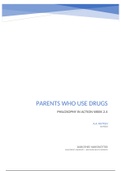PARENTS WHO USE DRUGS
PHILOSOPHY IN ACTION WEEK 2.4
A.A. RUTTEN
I6198638
DOROTHEE HORSTKÖTTER
MAASTRICHT UNIVERSITY – BACHELOR HEALTH SCIENCES
, STAGE 1
Yearly there are approximately 405.000 parents with children under 18 years in the Netherlands who
have a mental disorder and/or an substance-dependency (De Graaf, Ten Have & Van Dorsselaer,
2010). Parental drug addiction affects both the parent personally as their family members (Velleman,
2004). Growing up with addicted parents is associated with poor child developmental outcomes.
Children of substance-dependent parents face more health and behaviour problems and have
relatively poorer academic skills (Magdalena et al., 2019). Besides the challenges in raising their
children, parents with drug addiction have to deal with their own problems such as medication,
mental health and financial issues (Spiegelhoff & Ahia, 2011). Parents with custody are responsible
for the physical and mental wellbeing of their children, as well as stimulating their personality
development (Rijksoverheid, n.d.). These duties are often a serious challenge for parents with a drug
addiction and as a result losing custody is common among this group (Suchman, McMahon & Zhang,
2006). The primary consideration determining whether parents do or do not lose child custody is the
child best interest. However, taking away parental rights and duties, too, causes multiple issues for
both the parents and their children. This raises ethical questions. Which aspects make losing child
custody as a drug addicted parent a just decision? Which benefits of losing custody justify this
inequality? In my opinion is dissolution of child custody a justified decision when parental drug abuse
comes at cost of the child’s wellbeing. Even though it possibly affects the parents concerned amount
of self-respect, I personally believe the child’s development is more important in this critical period
of life. During my own childhood was my father struggling with some serious mental health
problems, however, not drug addiction. Nevertheless, his personal issues extended into our family
life. Knowing my father had enough to deal with already, I never felt comfortable speaking about my
own challenges nor ask my parents for help. Although my own experience is definitely not the same
as those of children with drug addicted caregivers, without a doubt losing custody seems the right
disposition. In this paper I will consider the moral aspects involved in parental drug addiction using
different philosophers’ theories about justice and social identities.
STAGE 2
Parks & Wike (2010) define justice as “getting what one deserves or is owed”, including having one’s
rights respected. Rights are morally justified demands that imply duties whereby someone else is
obligated to either do or not do something to facilitate this right. Regarding this case there are
multiple rights and duties involved. Child custody includes both rights and duties for the parents. To
be specific, parents have the right that their children respect and behave according to their demands.
Parents have the duty to raise their children in a proper way, providing the care they deserve.
Consequently, children have the right to receive proper care to facilitate their development and they
have the duty to act in this manner. What Rawls (2001) calls the liberty principle can be applied here:
everyone should have equal liberties. This means that all parents should have the same rights and
duties belonging to child custody, and similarly, all children should have equal opportunities to grow
up. Rawls also describes the difference principle, which includes the conditions that are to be
satisfied if the liberty principle is not met. Inequalities are morally accepted if they result in benefits
for the least advantaged citizens. This difference principle seems applicable to situations in which
parents with drug addiction lose custody. That is, parents are treated ‘socially inequal’ to benefit the
child’s development and well-being. Children might be interpreted as the least advantaged in this
case because of their vulnerability and dependency. Taking away custody could be viewed as being
treated unequal since every parent should have the rights and duties belonging to raising their child.
Authorities justify taking away custody by highlighting the importance of the child’s best interest. The
child’s well-being and development benefit from their parents losing custody. This justification will
become more complex when taking into account what Daniels (2009) states about equality and
differences. Diseases minimize one’s opportunities, and for this reason is health a contributor in
equality of opportunities. However, Daniels points out the popular misconception that improved
health is primarily in mediation of (access to) healthcare. Our health is much more determined by
what he calls ‘the social determinants of health’. Social circumstances during one’s existence play a




